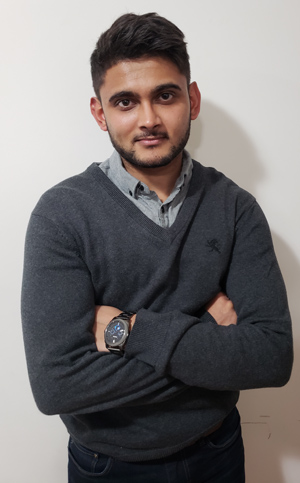
Hometown: Cleveland, Ohio
Undergraduate: The Ohio State University, BS in Biology
Can you tell me a little about yourself before you came to Drexel?
I’m from Cleveland, Ohio, and I went to Ohio State for undergrad where I majored in biology. I’m the first person in my family to go to college. It took me five years to get through school because I wasn’t sure what I wanted to do. At Ohio State, I was really involved on campus and helped found a club called Students for South Asian Service, which raised money for kids in underprivileged communities in South Asia so that they could go to school.
When did you know that you wanted to go into medicine?
I have always been interested in medicine because it embodies what I l am interested in the most—science, learning and using that knowledge to solve difficult problems to help people live better lives. However, I didn’t have a lot of exposure to the field. During undergrad, I got a job at the hospital as a medical scribe. I was in the emergency room and made charts for the doctors. I ended up getting to know a lot of doctors pretty well and saw the impact they had on peoples’ lives. I was really interested in that aspect of the job and realized that was what I wanted to do.
Why did you choose to apply to Drexel’s Interdisciplinary Health Sciences (IHS) program?
After undergrad, my GPA and MCAT scores were too low, so I started looking at post-baccalaureate programs. I spoke to someone who graduated from IHS and matriculated to medical school. They highly recommended the program to me, so I decided to apply. This program was different than others in that it allowed me to choose what classes I wanted to take and it also includes an MCAT class. I was able to tailor my schedule to work on my weaknesses and make myself a more attractive medical school candidate while simultaneously earning a master’s degree.
How is the program going so far?
I really enjoyed my two years here and think this is one of the best programs at Drexel for people in a similar position to me. I think it has a good track record based on people that I know who have gone through it to become better candidates for medical school. I enrolled in the program to enhance my stats to get into medical school, but I’m going to be leaving here with so much more than that. Not only did I get more exposure to the field of medicine, but I became a better student, I have stronger interpersonal skills, and I made lifelong friends. The faculty is also amazing here. They are all very talented and so passionate about what they do. It inspires me to want to do medicine more.
Can you tell me about any research that you have been doing?
Currently, I work in an immunology lab on the Queen Lane campus of the medical school. My principle investigator (PI) is Dr. Pooja Jain. I’ve helped with multiple projects that have been published by peer reviewed journals. Right now we are mapping the differentiation process of dendritic cells, which is a type of immune cell that is very important for innate and adaptive immunity. Dendritic cells come from bone marrow stem cells, which have different profiles of gene expression. We are trying to see how gene expression is changed throughout the differentiation process and how each of those genes leads to the phenotype of the dendritic cell.
Are you involved in any extracurricular activities?
As part of the program, I volunteered through Promoting Achievement and Learning Through Science (PALS). I also volunteer around the city through a nonprofit called iPraxis, which goes to charter schools in the Philadelphia area to help get kids interested in science. They hold science fairs, and I assisted several students and groups through the whole process of their science project for the fair. I’ve also worked at Sunday Breakfast, which prepares and serves meals to local homeless people. A lot of doctors from Hahnemann University Hospital volunteer there as well.
What are you planning to do after you graduate?
I’m taking a gap year. I will take the MCAT and apply to medical schools this cycle, but I’d also like to continue to do research, volunteer and find a job here in Philadelphia.
What advice do you have for students who are considering coming to Drexel’s IHS program?
Coming to a graduate program and coming to a new city can be a difficult, but I think it’s important to realize that you are not alone. We are all in the same boat. We all want to matriculate to a medical school, dental school or another type of professional school. The process can be very stressful at times, so I think it’s important to not hesitate to reach out for help if you are stuck. Express your questions, comments and concerns, and know that although it’s going to be stressful, there’s always a helping hand around the corner. It’s a common theme that by helping each other, we are more likely to find success individually.
This program really emphasizes collaboration and team-based pedagogies, which is heavily emphasized in the medical field. I am very close with my classmates and there’s no sense of competition between us. It’s kind of like a big family. I feel close with the faculty too. They are very personable, and they truly want to help you. They’re always trying to make sure you’re doing the best that you can do. If you come here, work hard and take advantage of all the resources Drexel has to offer, no matter what your background is, you will find success in your future endeavors.